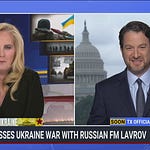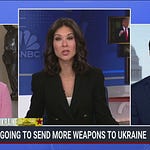This past week may go down as one of the darkest in the history of American power.
In a stunning one-two punch, the State Department announced the firings of roughly 1,300 diplomats - gutting the very lifeblood of our foreign policy - while Congress simultaneously approved a sweeping rescission package that slashed billions from our foreign aid commitments.
The result? America’s soft power has taken a historic blow, our diplomatic leadership is adrift, and our allies are asking: Where is the United States?
Let’s be clear about what just happened. This wasn’t just a budgetary adjustment or a routine reorganization. It was a bloodletting. The civil and foreign service professionals who were cut are the very people who make America strong and secure on the world stage. These are individuals who take an oath not to any political party or president, but to the Constitution - career diplomats who’ve served under both Democratic and Republican administrations, safeguarding American interests in every corner of the world.
And yet, their service was discarded with the stroke of a pen. Confused explanations. No mass email to staff from Secretary Rubio about the vision behind these moves. And to make matters worse, Rubio was overseas in Asia, while the very office in the department’s intelligence bureau tasked with analyzing the Russia-Ukraine war was terminated while he was meeting with Russian Foreign Minister Lavrov! You can’t make this stuff up.
This isn’t streamlining. This is self-sabotage.
Let me say it plainly: diplomacy is not waste. It’s strategy and it’s how we advance our national power in a comprehensive manner. Diplomacy is the first line of defense in our foreign policy toolkit. Cutting it is not only shortsighted - it’s dangerous. And it plays right into the hands of our adversaries. At a time when China is deepening its influence across Asia, Africa, and Latin America, when Russia is threatening our European allies, when Iran’s dangerous behavior persists, we’re reducing our presence at the table.
When I served at the State Department, I worked with patriots who held deep institutional knowledge on climate diplomacy, energy security, counterterrorism, human rights, and democracy promotion. These experts are now gone. That kind of expertise can’t be replaced overnight. What we’ve lost is irreplaceable.
The Trump Administration argues this is about efficiency. But slashing 15% of your workforce across the board is not efficiency - it’s a sledgehammer rather than a scalpel approach. If you want real reform, you do it through an inclusive, transparent process. You bring in stakeholders, conduct hearings, consult with Congress, and analyze outcomes. Instead, what we saw was a top-down fiat, not unlike the Trump-era “drain the swamp” mentality that treats public servants like political enemies.
And let’s not forget the congressional side of this tragedy. The foreign aid rescission, just rammed through the Senate by a 51-50 vote, guts bipartisan programs that have long kept the peace for decades. American foreign aid isn’t charity - it’s also strategy. From supporting Ukrainian resistance to deterring extremism in Africa to providing humanitarian aid across the Middle East, these investments protect American lives while advancing our values. They pay dividends in stability and influence.
Now that investment in both the world and America is gone. Our credibility is shot. Our adversaries are cheering. Our partners are nervous. And the signal we’ve sent to our own diplomatic and development corps is chilling: your service is expendable.
At its core, this is more than just a bureaucratic misstep. It’s a strategic failure. We are witnessing the dismantling of a cornerstone of American power, not by some external foe, but from within. And in a world beset by conflict, climate crises, and authoritarian resurgence, the stakes couldn’t be higher.
We must hold firm and aim to rebuild. But first, we must acknowledge the damage done.













Share this post